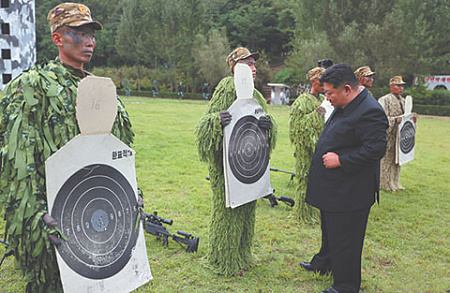
North Korean leader Kim Jong Un’s planned attendance at a major military parade in Beijing, his first visit to China in six years, signals a significant diplomatic maneuver for Pyongyang. Invited by President Xi Jinping for the 80th anniversary of the end of World War II, Kim is set to join over two dozen leaders, many from the Global South, in a gathering that showcases a growing alignment of nations challenging the Western-led international order. This high-profile appearance comes as North Korea skillfully navigates complex relationships with global and regional powers, aiming to break its long-standing isolation on its own terms.
While some Western observers have characterized Sino-North Korean relations as “cold,” especially compared to its burgeoning ties with Moscow, economic reality tells a different story. In 2023, China accounted for a staggering 97% of North Korea’s foreign trade, making it an indispensable economic lifeline. A key objective for Kim’s visit is likely the full resumption of Chinese tourism, a vital source of foreign currency that was halted by the pandemic after reaching a peak of 300,000 visitors, mostly from China, in 2019.
Simultaneously, Pyongyang has dramatically deepened its strategic partnership with Russia. Following a landmark visit by President Vladimir Putin to Pyongyang last year, the two nations revived a Cold War-era mutual defense pact. This renewed alliance has been solidified by widespread reports from Western intelligence that North Korea is supplying Russia with vast quantities of munitions for its war in Ukraine, allegedly in exchange for Russian oil, food, and advanced military technology that could further enhance Pyongyang’s weapons programs.
In a clear sign of North Korea’s growing strategic importance, both the United States and South Korea have expressed a renewed interest in dialogue. Former U.S. President Donald Trump and South Korean President Lee Jae-myung have publicly stated their willingness to meet with Kim. However, Pyongyang has remained steadfast, indicating that while personal relations between Kim and Trump are remembered as passable, no negotiations will resume until Washington abandons its demand for complete denuclearization.
This uncompromising stance is rooted in the collapse of the 2019 Hanoi summit with Trump, which failed to produce sanctions relief and was seen as a domestic setback for Kim. Since then, North Korea has aggressively expanded its nuclear and missile arsenal. Armed with a more powerful deterrent and backed by security guarantees from Russia and the unwavering economic support of China, Kim Jong Un is no longer merely reacting to international pressure. He is actively leveraging these alliances to assert North Korea’s role as a key, and increasingly influential, player in East Asian geopolitics.
